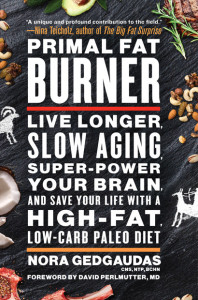Yet one more reason to adapt to ketone utilization as your body’s–and your brains primary source of fuel (as outlined in Primal Body-Primal Mind):
A study presented at the proceedings of the National Academy of Sciences in February of 2003 verified that blood sugar excess is a major vector for memory problems.
“Various factors were measured in the study including how participants performed on several memory tests, how quickly they metabolized blood sugar after a meal, and, through the use of MRI scans, the size of the hippocampus, the brain region responsible for for learning and recent memory.
Results indicated that people who metabolized sugar slowly (where blood sugar levels were more elevated) had a smaller hippocampus and scored worse on tests for recent memory.
The study is the first to show an association between the size of the hippocampus and the ability to control blood sugar levels in the body. Though further research is needed, this association suggests that delivery of glucose may influence hippocampal structure and function, researchers said.”
Sheesh–I could have told them that. No big surprise.
Conversely, other studies have clearly shown indication that many natural dietary fats seem to have a cognitive and memory enhancing effect, as well as the effect of powerful neurological stabilization (as evidenced by the effectiveness of ketogenic diets for eliminating seizures).
Since glucose is inherently reactive in the presence of oxygen and will tend to “stick” to things, any amount of glucose is going to have glycating and undesirable oxidative effects throughout the body–particularly the brain. The brain is the most vulnerable organ to the effects of glucose because it lacks the ability to respond to insulin. SOME blood sugar is a necessary and unavoidable thing (due to the unique needs of our red blood cells)…but the less dependent we are upon it, the better.
It’s logical to conclude that the less the brain is made to depend upon glucose as its primary source of fuel and the more it can be trained and adapted to depend upon ketones (the energy units of fat) for energy, the better, healthier and more efficient brain function becomes.
Nature would never have been so stupid as to design the human body and brain to be chronically dependent on so unreliable, inefficient and damaging a fuel as glucose. For one thing, we’re creatures of the Ice Age. Sugar and starch were not readily even available through a significant portion of our evolutionary history. Glucose is naturally meant to be the body and brain’s emergency “rocket fuel”–used mainly in more extreme and anaerobically demanding circumstances (read: demanding situations that leave you out of breath or during moments of major exertion). We can readily manufacture and store all the glucose we need from a combination of protein and fat in the diet. We store ample amounts of glucose in the form of glycogen in our liver and muscles that may be drawn upon for these purposes, and for feeding our red blood cells (the real reason ongoing blood sugar is at all necessary).
If you examine the value of both of our utilizable fuel sources, glucose/sugar and ketones/fat strictly from the perspective of the energy they provide the truth becomes obvious. Sugar, as a quick burning fuel can be viewed via analogy as a form of “kindling”. Commonly prescribed “whole grains”, brown rice and legumes can be looked upon as “twigs” for feeding the metabolic fire. Potatoes, white rice, bread and cereal can be viewed more like “paper”. Alcohol is the equivalent of “gasoline” on the fire–supplying a ball of flame and not much more. –Those ultra dependent on glucose will crave alcohol regularly as an emergency means to keep their metabolic fire going. A reformed alcoholic that has not dealt with the underlying blood sugar dependence issue will compensate for the elimination of alcohol with an ongoing perpetual sweet tooth (and likely, ongoing cravings for alcohol, as well). Changing one’s metabolic fuel dependence to ketones/fat instead of glucose/sugar, however, changes everything.
Have you ever tried to heat your home using a wood stove using nothing but paper or twigs to do the job? How often are you going to be forced to feed that fire? In the same way, people who function with that dependence on dietary carbohydrates for fuel become literally constant slaves to feeding their own metabolic fires every hour or two (lest they suffer reactive hypoglycemic episodes leading to emotional lability, brain fog, irritability, dizziness or cravings). This is why conventional nutritionists recommend eating every couple of hours to “maintain healthy blood sugar”. Anyone so metabolically adapted is also forced to bathe their brain in sugar constantly as a consequence of that dependence…and will risk cognitive impairment, hippocampal shrinkage and possible early dementia, as a result.
Fat, unlike sugar, is the fuel equivalent of putting a nice big log on the fire. Fat is more efficiently stored and possesses more calories per gram (on average), allowing for more prolonged and even burning. Fat is also designed to burn aerobically–meaning any time you aren’t overly exerting yourself or out of breath and are readily using oxygen…which is nearly all of the time (yes–this includes running marathons. Carb loading is NOT necessary or even desirable)!
Your brain is metabolically the most expensive organ in the human body (relative to energy demands). It occupies less than 5% of your total body mass but uses 20-30% of your total energy every day, just to maintain itself. Doesn’t it make sense that fat would be the far better choice for this? –Particularly since fat is what the brain is overwhelmingly made of and because healthy natural fat has no detrimental glycating or damaging impact by its presence.
The trick in accomplishing this metabolic changeover lies in the elimination of dietary sugar and starch and the appropriate increase in dietary fat necessary to satisfy appetite and energy needs. The quicker this can be accomplished, the better (as opposed to “gradual changeover”). Supplements such as L-glutamine, L-carnitine and herbs such as Gymnema sylvestre can serve as metabolic “training wheels” to help facilitate the metabolic changeover more rapidly and with far less discomfort for some.
So–to put it all in a nutshell–what’s the single most beneficial step you can take to greatly improve the function and performance of your brain and memory?
–Become a “fat head”!!



Thank you for this item. It clarifies and puts succinctly the rationale (one of them) for ditching the carbohydrates. I am always on the lookout for explanations that don’t require someone to read the whole book.
Which doesn’t mean one shouldn’t read the whole book.
And..of course…the book is about WAY more than just “ditching the carbohydrates”. 🙂
Good for you! I can’t believe she said that to you! You sound like a model patient to me!My mood does change with highs and lows. When I am low, I get very irritable and kind of panicky. I don’t feel highs as much anymore but I will get lathargic and light-headed, which can happen with lows too.